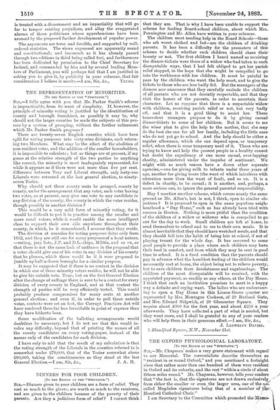THE OXFORD PHYSIOLOGICAL LABORATORY.
[To THE EDITOR OF THE h SPECTATOR:1 SIR,—Mr. Chapman makes a very grave statement with regard' to our Memorial. The memorialists describe themselves as "resident in or round Oxford," and you mentioned a fortnight since that rather more than one hundred of them were resident in Oxford and its suburbs, and the rest "within a circle of about fifteen miles round." Mr. Chapman, however, tells your readers. that "the fact is, that the signatures are not drawn exclusively, from either the smaller or even the larger area, one of the rod- called Magdalen signatures being that of a member of le- Hereford Cathedral Choir."
I am Secretary to the Committee which promoted the 319.enzo-
alai. I took exceeding care that no signature should be sent. in to the Hebdomadal. Council from any one fifteen and a half miles off, and I say that Mr. Chapman cannot make good his assertion. I have no hesitation in conjecturing that it rests -entirely on an error of his own, or some informant of his, in con- founding the Rev. G. H. Lambert, M.A., of Magdalen, with the Rev. J. H. Lambert, 31.A., of Magdalen. The former, who is Rector of Emmington, near Thame, did sign ; the latter, who was a member of• the Hereford Cathedral Choir, has neither signed, nor been asked to sign.
In that case, the curious question arises,—How comes Mr. Chapman to know of the signature at all ? I did not mention it, even to my Committee, and the paper containing it went straight from me to the Council, without having been seen by any third party. If Mr. Chapman had derived the knowledge from Mr. Lambert, or any friend of Mr. Lambert's, he would hardly have asserted that the Rector of Emmingtou was the member of the Hereford Cathedral Choir. The conclusion is almost forced upon me that either Mr. Chapman has been .allowed access to the memorial while it bus been lying before the Council, or that the information has come to him, directly or indirectly, from some member. of the Council. The former -conjecture is impossible of acceptance, and, if the latter is correct, is it proper that the communication of a name by a member of the Council should, while the memorial is still before -Council, be used by one outside as the basis of what is prac- tically—whether Mr. Chapman so meant it or not-7a public imputation on our bona fides?
The rest of your statement of facts was also correct, but Mr. 'Chapman's right to show the other side of the shield is beyond cavil. I am ready to give him, here or privately, a consider- able bill of exceptions to both his sets of figures ; but it would serve no useful object, and I do not want to keep up irritation for irritation's sake. As to the inference which was drawn, it is one which I also have drawn, but it is based on too low figures to be by any mezns conclusive, and for the same reasons I prefer to say nothing further than that about it. It is an unfortunate feature in controversies of this kind that one cannot help saying and doing things, in the interest of what -one feels to be right, which must be disagreeable to many other people, and people whom one particularly regrets to annoy; and I am sorry to have been obliged by a statement of Mr. Chap- man's to remark on it as I have done. I sincerely trust that we shall have a speedy opportunity of proving decisively which party is the stronger, and shall then return at once to our normal peacefulness.—I am, Sir, &c.,
EDWARD B. Nicuoisox, Bodley's Librarian.
P.S.—Since I wrote the above, the Hebdomadal Council- -who might have caused my closing hope to be realised by next Wednesday, by acceding to the prayer of the memorial and -allowing Convocation to vote "Yes" or "No" on the matter— have declined to accede to it. It would be childish to say that the Council are bound to submit-any matter of dispute to Con- vocation when they receive a memorial asking them to do so, but here is a case in which nearly one-third of the resident members of Convocation signed, and in which the question at issue was not one of religion, or politics, or education, or finance, but of the University's view of the elementary principles of right and wrong. It is unreasonable to suppose that when those are in question, and when the memorialists have good reason to believe that Convocation would be with them, they should be content with a refusal to allow Convocation to decide. I am not writing now as Secretary of the Committee, for the 'Committee have had no time to meet, but, personally, I shall be glad if all friends who are members of the Convocation of this University will send me, at 2 Canterbury Road, Oxford, their names and addresses on a postcard. I must excuse myself from writing back, as my entire day is taken up with library work, and for months past all my evenings have been taken up with the memorial, but my silence will not mean inattention.







































 Previous page
Previous page